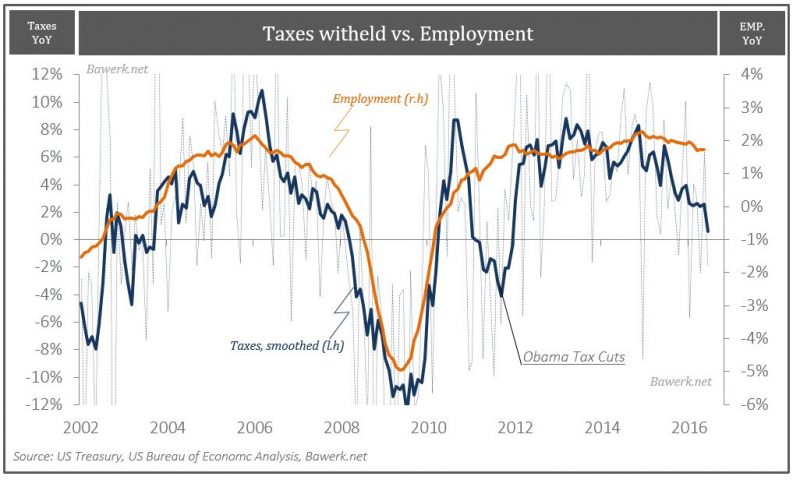Okun’s law is the simple relationship between employment and GDP. Each new job is able to increase GDP. However with weaker and weaker productivity growth, Okun’s law may not be valid any more]
Okun’s LawThe great “science” of economics once discovered an empirical relationship between GDP and unemployment that has been dubbed Okun’s Law. It simply states that the unemployment rate rises as GDP contracts, or vice versa, as production shrinks less people will be employed. It is not exactly rocket science.
|
|
Downtrend in taxes, while employment is increasingHowever, this made us think about another relationship we have observed lately. US government real tax receipts have been trending downwards while employment has kept up remarkably well. If we draw a chart of US withholding taxes (smoothed from all the short-term noise) and overlay that with employment growth, we find a worrisome divergence that has historically not been there. |
|
Taxes cannot cope with GDP GrowthIf we plot the same chart, but using annual change in real GDP instead of the annual employment growth, everything seem to fall into place though. What can explain this dichotomy? The most obvious explanation is the increased employment of low paid workers with lower productivity relative to what we have seen in previous recoveries. Substituting $50 – 100k full time breadwinner jobs with barmaids and waiters is certain to drive down wages (and hence taxes) and GDP as the marginal productivity of each additional new hire is lower than the previous. Both productivity statistics and the monthly labour market report substantiates our view. |
|
U.S. Labour ProductivityYears of capital consumption have led to peak debt whereby each additional unit of debt reduces economic growth instead of artificially stimulating it. There is only one way out of this, and that is a wholesale admission that current policies of extend and pretend is no longer working; unfortunately only real crisis seem to focus minds enough to implement necessary changes. Until then, the painful slog will continue. Our dire prediction for the future is simply one where the confluence of a struggling middle class and politics jointly forces through some sort of structural change. These usually makes things much worse before the system reset toward a more sustainable path. Upcoming elections in Italy, the US, the Netherlands, France, Germany and Spain in a post-Brexit environment provide ample opportunity for radical change. |
Tags: Economics,newslettersent,Okun's Law,Taxes,U.S. Gross Domestic Product,U.S. Nonfarm Productivity,US







































